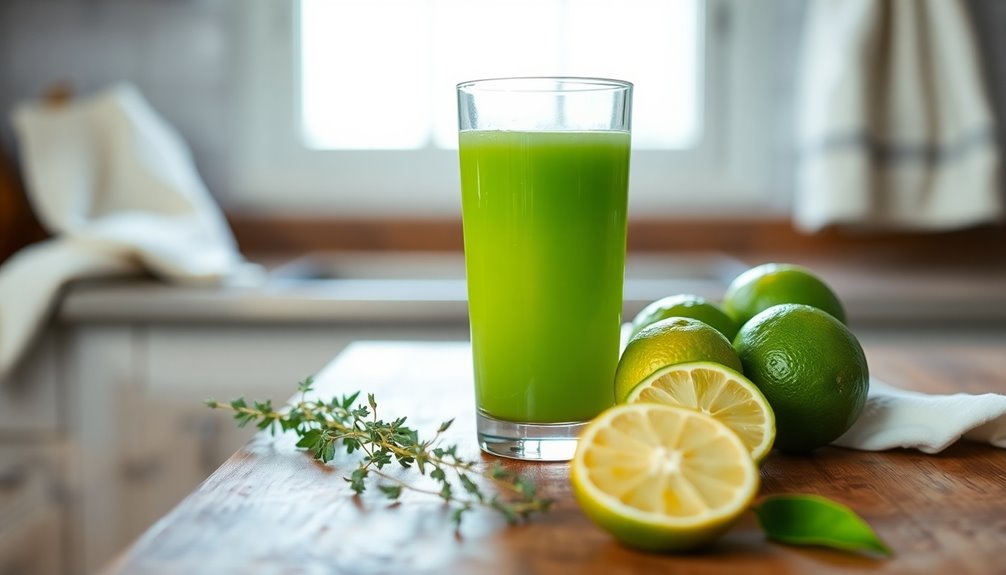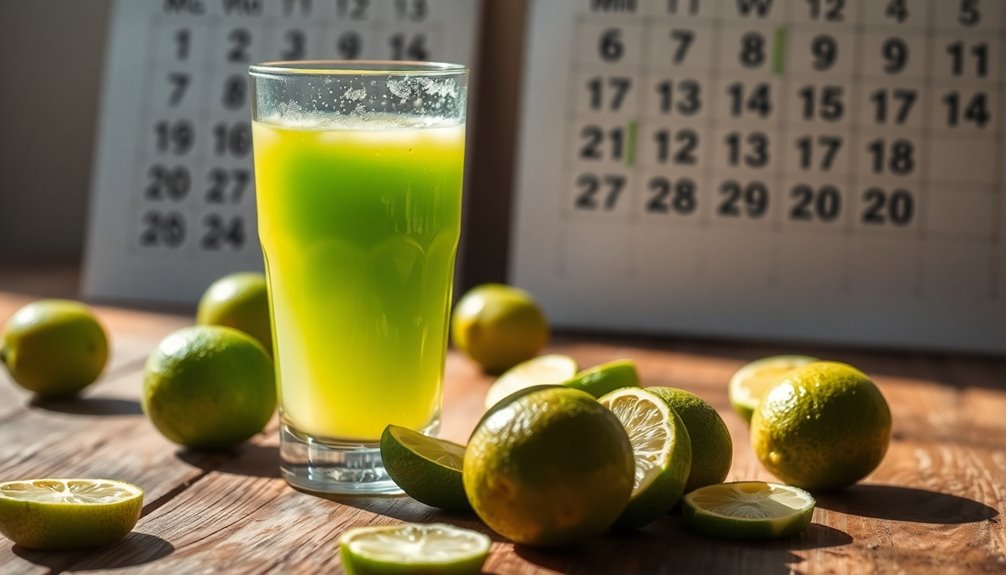Lime juice won't stop your period, and there's no proven amount that can delay it. Some research shows it might affect menstrual cycles, but the evidence is limited and mostly from animal studies. High consumption can also lead to digestive issues. If you're looking for natural methods to influence your cycle, there are other options to consider. Keep checking in for more insights on managing menstrual timing and natural remedies.
Key Takeaways
- There is no scientific evidence supporting lime juice's ability to stop or delay menstruation in humans.
- Animal studies suggest lime juice may disrupt estrous cycles, but results may not apply to humans.
- No established dosage or recommended amount of lime juice exists for menstrual delay.
- High consumption of lime juice can cause mouth, throat, and stomach irritation; moderation is advised.
- Consult a healthcare professional before using lime juice or any remedy for menstrual concerns.
Understanding the Effects of Lime Juice on Menstruation

While you might've heard claims about lime juice affecting your menstrual cycle, it's important to approach these ideas with caution.
Scientific evidence doesn't support the notion that lime juice can stop or delay menstruation in humans. Animal studies show it can disrupt the estrous cycle and partially block ovulation, but these findings don't directly apply to human physiology. Unlike lemon juice, which has more documented effects, lime juice lacks robust research backing its influence on menstrual timing. Menstruation is a natural part of the female body, and it is crucial to embrace it rather than seek to change it.
While lime juice is rich in vitamins and citric acid, consuming large amounts can irritate your stomach.
If you're considering natural remedies for menstrual issues, it's crucial to consult healthcare professionals and rely on evidence-based practices for better outcomes.
The Science Behind Lime Juice and Menstrual Delay

Although the connection between lime juice and menstrual delay isn't fully understood, its chemical composition raises intriguing possibilities.
Lime juice contains citric acid and vitamins that might influence your hormonal levels, potentially altering menstrual cycles. Animal studies have shown that lime juice can disrupt the estrous cycle and partially block ovulation in rats.
Interestingly, a study on Tahiti lime juice found it reduced the duration and intensity of menstrual bleeding in humans. However, the exact mechanism behind these effects remains unclear. Average blood loss during a period is about 1 to 5 tablespoons, which highlights the significance of any potential reduction in menstrual flow.
While these findings are promising, there's no broad scientific consensus on lime juice's impact on human menstruation. More research is necessary to fully understand how lime juice could affect your menstrual cycle.
Recommended Dosage for Lime Juice Consumption

When considering how much lime juice to consume for potential menstrual delay, it's important to note that there's no established dosage backed by scientific evidence. Typically, people drink lime juice in small amounts due to its acidity. Some social media claims suggest using two shots mixed with Tajin and salt, but these ideas lack scientific support. High consumption can lead to irritation of your mouth, throat, and stomach, so moderation is key. It's wise to consult a healthcare professional before trying lime juice for this purpose. Dietary changes, including excessive lime juice, can influence menstrual cycle timing.
Other Natural Methods to Delay Your Period

If you're looking for natural methods to delay your period, several options are often suggested, though their effectiveness varies widely.
Apple cider vinegar and lemon juice are popular remedies, but there's no scientific evidence backing their claims. Natural remedies often lack rigorous research to support their effectiveness. Gelatin may delay your period for a few hours when taken in warm water, but research is lacking.
Foods like cinnamon tea, watermelon, and cucumber are believed to help, yet their efficacy remains unproven. Lifestyle changes like vigorous exercise and stress management are also mentioned, but their direct impact on delaying periods isn't clear.
Safety Concerns of High Citrus Consumption

Many people enjoy citrus fruits for their refreshing taste and health benefits, but excessive consumption can lead to several safety concerns.
If you consume more than one serving of citrus juice or fruit daily, you might increase your risk of melanoma, especially from fruits like oranges and grapefruits, which contain psoralens. These compounds can heighten your skin's sensitivity to UV radiation, raising your melanoma risk by about 9% with each additional serving. Additionally, UV exposure remains the primary cause of melanoma, highlighting the importance of monitoring your citrus intake alongside sun safety.
Additionally, high citrus intake can cause digestive issues, allergic reactions, and potential interactions with medications.
Always consult a healthcare professional before using citrus juice for health purposes to ensure you’re making safe choices for your body. Additionally, it’s important to consider any allergies or sensitivities you may have to citrus fruits, as these can impact your health positively or negatively. If you’re looking to incorporate more citrus into your diet, research lemon juice extraction tips to maximize the flavor and nutritional benefits without losing essential nutrients. Remember, making informed choices with guidance from a healthcare professional can help you achieve the best results for your well-being.
Comparing Natural Remedies With Medical Methods

While natural remedies can offer some benefits for menstrual control, they often lack the scientific backing and effectiveness that medical methods provide. For instance, tamarind, lemon juice, and ginger may help with symptoms, but their efficacy is largely anecdotal. In contrast, hormonal birth control is proven to regulate hormones and manage menstrual cycles effectively through established research. Pelvic floor exercises and heat therapy can alleviate cramps, while acupuncture targets hormonal balance. When it comes to menstrual management, consulting healthcare providers is crucial for personalized, safe advice. Relying solely on natural methods mightn't provide the reliable results you need, so it's wise to consider a balanced approach that combines both natural and medical strategies for optimal menstrual health.
Lifestyle Factors That May Influence Menstrual Timing

Understanding how lifestyle factors influence menstrual timing is crucial for maintaining menstrual health. Your dietary habits play a significant role; frequent fast food consumption can lead to irregular cycles. Engaging in regular physical exercise can help stabilize your menstrual cycle, as seen in 77.4% of active individuals. Yoga practice is even more effective, promoting regularity in 91% of participants. On the other hand, being overweight or obese increases the likelihood of irregular cycles, affecting 65.2% of those individuals. Additionally, high stress levels can disrupt your menstrual patterns. Abnormal menstrual patterns such as amenorrhea and dysmenorrhea can also be exacerbated by academic stress and lifestyle choices. Focusing on a balanced diet, maintaining a healthy weight, and managing stress can significantly improve your menstrual health and cycle regularity.
Frequently Asked Questions
Can Lime Juice Permanently Affect My Menstrual Cycle?
Lime juice won't permanently affect your menstrual cycle.
While some studies suggest it may cause temporary disruptions or irregularities, there's no scientific evidence proving long-lasting changes in humans.
The citric acid in lime juice might influence your cycle for a short time, but any effects aren't well understood.
It's best to consult a healthcare provider if you're considering using lime juice for menstrual management, as safer alternatives exist.
What Are the Side Effects of Excessive Lime Juice Intake?
Imagine sipping a zesty glass of lime juice, the tang dancing on your tongue.
But be cautious—too much can lead to acid reflux, leaving you with a fiery heartburn. Your teeth might feel more sensitive, as the acidity erodes enamel like waves crashing against rocks.
You may even face digestive troubles, like nausea or stomach cramps.
Moderation is key; enjoy the refreshing taste, but don't let it disrupt your health.
Is Lime Juice Effective for All Women?
Lime juice isn't effective for all women when it comes to delaying menstruation.
While some might report positive results, individual responses vary significantly. You might find that lime juice has no impact, or it could lead to digestive discomfort.
Since there's no scientific backing, it's best to consult a healthcare professional before trying it.
Reliable options like hormonal contraceptives are safer and more effective if you're looking to manage your menstrual cycle.
Can Lime Juice Interact With Medications?
Imagine pouring a splash of lime juice into a delicate recipe—too much can ruin the dish.
Similarly, lime juice can interact with medications, altering their effects. It can boost the potency of drugs processed by the liver, like statins, and heighten sensitivity to sunlight when paired with certain medications.
If you're on medication, it's wise to consult your healthcare provider before adding lime juice to your diet to avoid unwanted surprises.
Should I Consult a Doctor Before Using Lime Juice?
You should definitely consult a doctor before using lime juice for any health-related purpose.
A healthcare professional can assess your individual situation, ensuring it's safe for you. They'll help you understand potential risks, like digestive issues or allergic reactions, and provide personalized advice.
Remember, relying on unverified remedies can lead to unexpected outcomes, and it's always best to prioritize your health with evidence-based practices.
Don't hesitate to seek professional guidance.
Conclusion
In the quest to pause your period, lime juice might seem like a tempting shortcut, but remember, it's not a magic potion. While it may offer some benefits, it's essential to approach this remedy with caution. Consider other natural methods and consult a healthcare professional for safe options. Just like a clock, your body has its own rhythm, and tampering with it can lead to unexpected consequences. Stay informed and make choices that align with your health!
Susannah expertise lies in researching and compiling evidence-based content on juicing, nutrition, and overall health. She is committed to ensuring that The Juicery World offers accurate, up-to-date, and trustworthy information to empower readers to take control of their health. Susannah’s goal is to inspire individuals to embrace juicing as a way to nourish their bodies and live their best lives.











